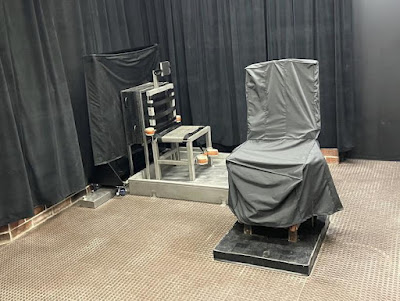COLUMBIA — State prison officials revealed details on how death sentences are carried out as they took the stand in a trial challenging the constitutionality of executing inmates by firing square or electrocution, the only options available under state law.
Much of the testimony Aug. 2 from Corrections officials involved how much — or how little — research went into creating the rules.
That included the type of ammunition executioners would fire from their rifles — .308-caliber Winchester, which is used by military and police officers — and the lack of changes to the state’s electric chair since it was first used in 1912.
The lawsuit from Justice 360, a nonprofit that opposes the death penalty, argues both available methods are unconstitutionally “cruel and unusual punishment.” Its lawyers sought to portray that even the agency’s highest officials can’t offer scientific reasoning for the rules.
Colie Rushton, the director who wrote the firing squad protocols finalized in March, said he consulted with just one expert — a prisons official in Utah — along with documents he found on the internet. He did not seek input from medical officials or munitions experts, he said.
Utah is the only state that has carried out an execution by firing squad since the U.S. Supreme Court reinstated the death penalty in 1976.
Corrections Director Bryan Stirling defended the protocols as effective and humane.
“If you’re shot in the heart, you tend to die instantly,” he told the court.
As the agency’s security director since 2007, Rushton oversees regular testing of the electric chair. However, he testified he didn’t know why certain voltage levels are used, nor has he asked for an explanation.
No prisoner has chosen to die by electrocution since 2008.
Death by lethal injection was the default method of executing death row inmates in South Carolina, beginning in 1995, when electrocution became an option. But the state’s supply of the three-drug cocktail expired in 2013, and opposition to the death penalty has made pharmaceutical companies unwilling to replenish the agency’s supply. Stirling has sworn in court documents that his agency has tried multiple ways to secure the drugs, and all attempts were unsuccessful.
A law signed by Gov. Henry McMaster last year reverted to the electric chair as the default method and added the firing squad as an option. It keeps lethal injection as an alternative, if the drugs become available again.
The first death row inmate forced to make a choice was Richard Moore in April, who selected the firing squad while still disputing its legality.
The attorneys for him and others on death row did not challenge the state’s right to carry out executions. Instead, they argued the state had to prove the two available methods were as painless and efficient as possible.
“All executions that we look at, other than a few anomalies of the last 100 years, end in death,” attorney Joshua Snow Kendrick said in opening statements. “The question is when did it happen.”
"The pain could be excruciating"
The effectiveness of the electric chair was central to the first day of testimony, as Justice 360 attorneys focused on the autopsy reports of inmates executed by electrocution in South Carolina and other states.
Only seven other states, including Florida and Kentucky, still allow execution by electrocution, according to the Death Penalty Information Center.
In nearly two hours of testimony, Vanderbilt University biological cist John Wikswo — who has served as an expert witness in numerous death penalty cases around the country — cited anecdotal evidence as well as various studies to argue the state’s electrocution methods were arbitrary. He said the pain could be excruciating with no guarantee the inmate would die immediately.
Farmers who raise animals for meat “would not do to an animal in the slaughterhouse what would be done to an inmate in South Carolina,” he said.
But attorneys for the state argued Wikswo’s claims were largely speculative, since those experiments were on animals, not humans. The state shouldn’t have to prove an inmate’s death would be painless and instantaneous, they argued.
Ultimately, the state Constitution gives the authority to sentence people convicted of killing others to death, they argued.
“For too long, the victims and the families of the victims have waited for justice,” attorney Daniel Clifton Plyler said.
Deliberations are expected to continue through Aug. 4.
🚩 | Report an error, an omission, a typo; suggest a story or a new angle to an existing story; submit a piece, a comment; recommend a resource; contact the webmaster, contact us:
deathpenaltynews@gmail.com.
Opposed to Capital Punishment? Help us keep this blog up and running! DONATE!
"One is absolutely sickened, not by the crimes that the wicked have committed,
but by the punishments that the good have inflicted." -- Oscar Wilde













